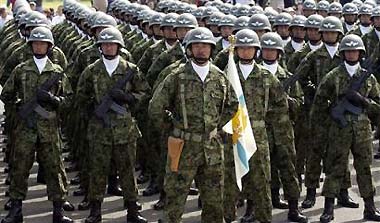|
Japan defense plan shifts pacifist stance
(Agencies)
Updated: 2004-12-10 23:21 TOKYO - In a shift away
from its postwar pacifism, Japan's government overhauled its defense guidelines
Friday, easing an arms exports ban and singling out North Korea and China as
security threats.
 |
| Members of Japan's Ground Self-Defense Force stand at attention
during the annual inspection parade of the JGSDF East Area division in
this Oct. 5, 2003 file photo. [Reuters] | The overhaul, which also allows the government to develop a missile defense
program with the United States, has raised concerns about a slow erosion of the
pacifist society Japan built after World War II.
The opposition Social Democratic Party, one of the smallest parties in
parliament, criticized the government for removing self-imposed controls on
military development.
The changes also have been watched uneasily by some of Japan's Asian
neighbors, who suffered under Tokyo's expansionist policies in the first half of
the last century. The guidelines sought to allay such fears, saying Japan's
military would not go on the offensive.
"Our country, under our constitution, will adhere exclusively to
self-defense," the report said. "Following our policy of not becoming a major
military power that would pose a threat to other countries, we will secure
civilian control."
The plan, approved in a Cabinet meeting Friday, also calls for Japan to
participate in international peacekeeping missions, underscoring Tokyo's efforts
to play a global security role that better matches its economic strength.
The revised guidelines fits with Japan's
decade-long effort to increase security cooperation with the United States. The
pro-U.S. government on Thursday approved a one-year extension of the military's
humanitarian mission in Iraq.
The government also authorized an ease to a longtime ban on arms exports
to allow for the missile defense program with the United States. The guidelines
cited the threats posed by North Korean missiles, China's military buildup and
terrorism.
"This is about ensuring security and dealing with new threats as the
times change," Prime Minister Junichiro Koizumi told reporters.
Pyongyang became one of Tokyo's biggest security worries after it
test-fired a long-range ballistic missile over Japan in 1998, prompting Tokyo to
begin researching missile defense. North Korea also has an active nuclear
weapons development program.
Japan has maintained an arms export ban since 1976. Chief Cabinet
Secretary Hiroyuki Hosoda said the government, however, would make exceptions to
pursue missile defense with Washington for security purposes.
Ken Jimbo, director of the Japan Forum on International Relations, said
the plan signaled that Japan's defense policy was adjusting to a post-Cold War
world.
"It's epoch-making that the guidelines now call for a flexible,
multi-faceted military instead of the stiff military foundation that's been in
place until now," said Jimbo.
The guidelines vowed to maintain the current policy of not making or
possessing nuclear weapons. Japan is the only country to have been attacked with
nuclear weapons, when the United States twice hit the country in 1945.
The new defense outline, which covers from 2005 to 2014, also singles out
China as a security concern, pointing out that Beijing has expanded the range of
its military activities at sea and has been modernizing its naval and air force.
Hosoda played down the reference.
"It does not mean that we consider China a threat," Hosoda said at a news
conference.
Japan's navy went on alert last month when a Chinese submarine was detected
in the country's waters between the southern island of Okinawa and Taiwan. Japan
says that China apologized, but tensions remain high.
Jimbo said the new guidelines would likely irritate Beijing but that Japan
would also be seeking to deepen ties with its neighbor even as it follows the
plan.
"China will undoubtedly express displeasure with the guideline revisions, but
Japan can also cooperate with China by expanding exchanges," Jimbo said. "It's a
two-pronged strategy."
The new guidelines followed Tokyo's extension Thursday of its largest foreign
military operation since World War II. Japan currently has 550 ground troops in
Iraq on a humanitarian mission to purify water and rebuild infrastructure. The
mission follows the dispatch of the navy to provide logistical support to forces
fighting in Afghanistan (news - web sites), a mission launched in 2001.
Acknowledging the budget pressures Japan will face as its population rapidly
ages, the guidelines call for cutting the number of ground forces and tanks. The
ruling Liberal Democratic Party on Thursday approved a 3.7 percent cut in
defense spending.
| |
 |
|
 |
|
|
Today's
Top News |
|
|
|
Top World
News |
 |
|
 |
|
|
|
|
|
|